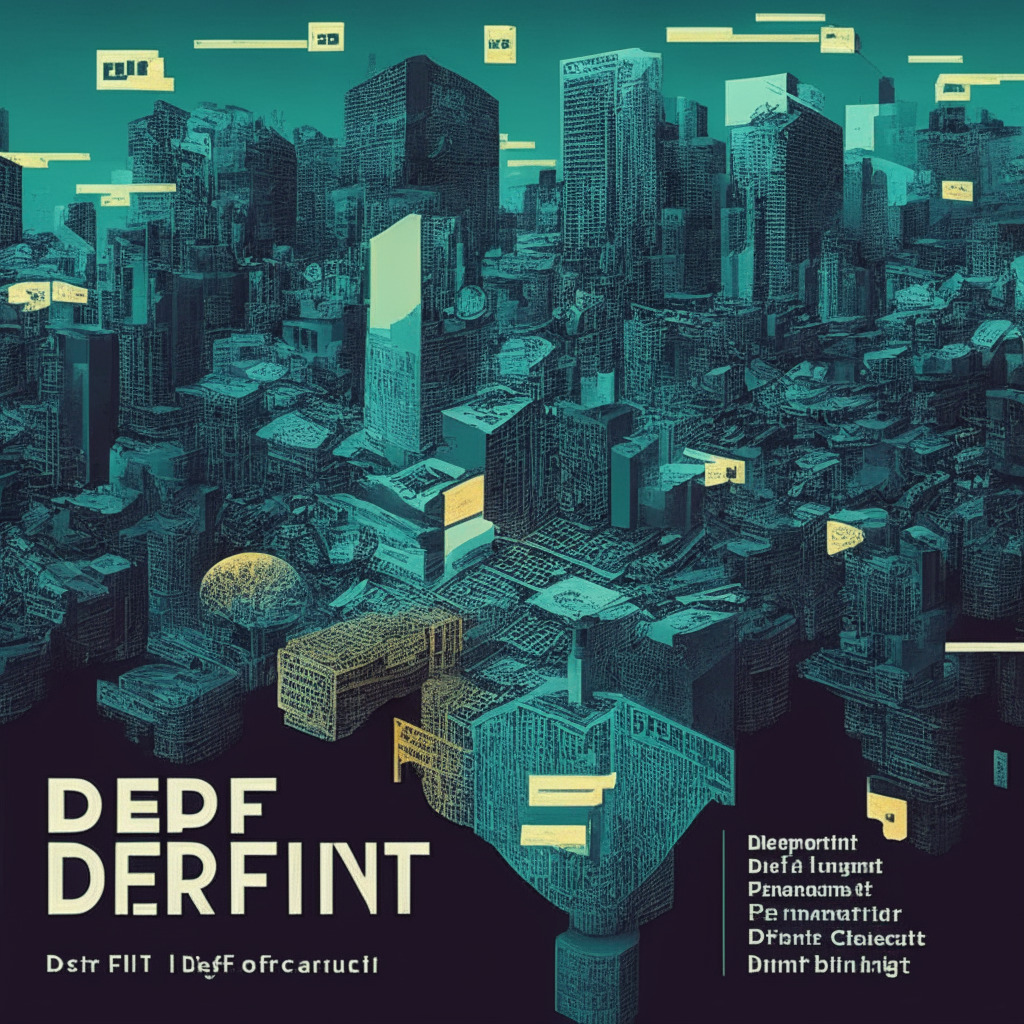BlockFi faced bankruptcy, freezing assets and affecting users with crypto in interest-bearing accounts who lost rights to $375 million. Judge Kaplan ruled BlockFi must return $300 million to custodial wallet users, highlighting challenges and the need for clear communication, transparency, and regulation in the digital asset industry.
Search Results for: Custodia Bank
2023 Crypto Crackdown: Operation Choke Point 2.0 vs Banking Industry Collapse
The US regulators’ crackdown on the crypto market has led to the closure of Silvergate, Silicon Valley Bank, and Signature, while prominent figures criticize scapegoating cryptocurrencies for the banking crisis. The House Financial Services Committee investigates potential coordinated efforts to de-bank the crypto market as the banking crisis worsens.
The Need for Regulating Crypto Custodians: Safeguarding Digital Assets and Building Trust
A robust regulatory framework specifically designed for custodians is crucial in the evolving cryptocurrency industry. Custodians mitigate risks by safeguarding digital assets, separating them from exchanges. Governments must establish transparent rules enabling custodians to operate legally, ensuring investor protection and a secure ecosystem.
Democratic Candidate Links Anti-Crypto Sentiment to Bank Failures, Sparks Debate
Presidential candidate Robert Kennedy challenges anti-crypto sentiment within the Democratic party, attributing regulatory agencies’ “war on crypto” to several bank failures in March. He criticizes the FDIC and SEC for targeting crypto and leaving banks as collateral damage while expressing concerns about the suspected “Operation Chokepoint 2.0” government conspiracy.
Banking Crisis vs Digital Assets: The Financial Revolution Beckons
Amidst financial chaos in the banking industry, digital assets and decentralized finance (DeFi) emerge as beacons of hope, offering opportunities for a new financial system focusing on access, inclusivity, and self-autonomy, potentially revolutionizing traditional banking with blockchain technology.
Consensus 2023: Web3 Adoption, Corporate Interest, and the Need for Global Integration
Consensus 2023 showcased growing interest in Web3 technology adoption among large companies like Mastercard and Google Cloud. The event focused on essential Web3 strategies, innovations, and privacy, but could benefit from a stronger international presence to understand global opportunities.
Courageous Move Saves FTX Cryptocurrency Exchange from Potential Theft Debacle
“In a daring rescue, adviser Kumanan Ramanathan from Alvarez & Marsall helped prevent a major crypto robbery at FTX crypto exchange. Amidst chaos, Ramanathan utilized a Ledger Nano hardware wallet to secure remaining assets, preventing further losses and saving millions in the process.”
Wirex’s W-Pay: Future DeFi Gamechanger or Just Another Crypto Wild Card?
Wirex’s new service, W-Pay, introduces a non-custodial crypto debit card service leveraging Zero-Knowledge (ZK) proofs-based technology. This service offers a new way of interacting with cryptocurrencies daily, promising swift, secure transactions, and sole control over funds. However, ongoing challenges with partnership dependencies may pose questions about the technology’s reliability.
Assessing Blockchain Impact on Financial Inclusion: Stellar, PwC Framework and Challenging Skepticism
The Stellar Development Foundation and PricewaterhouseCoopers (PwC) have launched a financial inclusion framework to assess the effectiveness of blockchain projects in emerging markets. They found that blockchain-based payments enhance accessibility, reduce transaction costs, and increase transaction speed, notably in financially underserved areas. However, they stress on the importance of responsible design principles and robust governance to mitigate potential challenges and criticism.
Navigating the Dichotomy of Blockchain’s Future: Innovation vs Regulation
“Yield Protocol’s decision to cease operations, impacted by decreased demand and strict regulations, juxtaposes with Wirex’s launch of W-Pay, a bridge for decentralized applications and traditional payment infrastructures. The future of blockchain remains uncertain amid these contrasting developments.”
Balancing Act: US Bill Stirs Debate on Off-Chain Transactions Regulation
A new U.S bill introduced by Representative Don Beyer, aims to regulate off-chain crypto transactions by requiring service providers to report all such transactions to a CFTC-registered repository. The bill strives for increased transparency to prevent potential disputes, manipulation, and fraud, although concerns about privacy infringement and stifling innovation are being raised.
Regional Crypto Reality: From VPN Penalties to CBDC Airdrops in Asia’s Landscape
“In the Asian crypto landscape, contrasting narratives surface – rigid policy making restricts tech freedom, exemplified by a developer penalized for VPN use by China’s Great Firewall, versus progressive digital adoption, as evidenced by Hangzhou’s 10 million e-CNY airdrop and Alibaba’s move into crypto securities.”
Kraken Crypto Exchange’s Brave New Leap: Stocks and ETFs By 2024
San Francisco’s crypto exchange Kraken is reportedly considering introducing stock and ETFs on its platform, marking the first crypto exchange to expand past cryptocurrencies. Given the target year of 2024, these additions could flag a new era in trading platforms. Despite challenges, if successful, this could serve as a benchmark for other crypto exchanges to diversify asset classes.
Kraken’s Expansion in Europe: Spearheading the Crypto Revolution with Key Regulatory Approvals
Crypto exchange Kraken has secured regulatory approvals in Spain and Ireland, furthering its expansion plans in Europe. With a Virtual Asset Service Provider license and an EU e-money license, Kraken will provide digital asset exchange and custodial wallet services.Investment into regulatory framework positions Europe as a promising arena for crypto growth.
Kraken’s Regulatory Triumph and Tussle: A Tale of Two Crypto Jurisdictions
“Kraken, a major crypto exchange, recently received Electronic Money Institution and Virtual Asset Service Provider registrations in Ireland and Spain, marking progress towards crypto acceptance in Europe. However, it faces controversy with Australian regulators, highlighting the careful balance required in this evolving industry.”
Crypto Week Review: Binance vs SEC, Tether Lifeline for Tron and Controversy at FTX
This article explores recent developments in the crypto world, including the SEC’s setback in their investigation into Binance.US, the proposed dismissal of a lawsuit against Binance and its CEO, and delay in repayments by defunct exchange Mt. Gox. Noteworthy is Tether’s decision to authorize $1 billion USDT to the Tron network, a lawsuit against FTX founder’s parents, and Grayscale filing for a new Ether futures ETF.
Crypto World Featuring: The JPEX Scandal, Mt. Gox Delays, and DCS’ New Venture
Last week’s Token2049 conference saw Hong Kong cryptocurrency exchange JPEX staff flee amid arrest threats over a $166M scandal. The incident, which potentially affected 2,000 users, emphasized the need for trading platform awareness and regulatory measures to ensure safe trading.
Ebbing and Flowing Tides: Korea’s Blockchain Landscape Amidst Market Speculation and Gaming Innovation
“Korea Blockchain Week spotlighted the rise of blockchain in gaming industry. The downfall of local Terra blockchain led to increased scrutiny in Korean projects. Despite skepticism, trade activity on local exchanges is rising, and mainstream banks are exploring crypto custodianship.”
Bull Bitcoin’s Global Reach: The Partnership with SINPE Movil and Bitcoin Jungle Explained
Bull Bitcoin, a Canadian Bitcoin-only exchange, has partnered with Costa Rica’s primary fiat payment system, SINPE Movil, and local crypto wallet, Bitcoin Jungle. This strategic alliance would simplify conversions between local currency, Colones, and Bitcoin and facilitate conversions to and from bank accounts. This marks the start of Bull Bitcoin’s plans to increase global reach.
Opera Mini Harnesses the Power of Blockchain with MiniPay: Reshaping Africa’s Mobile Payment Landscape
Opera Mini has announced a partnership with Celo Blockchain to launch a non-custodial wallet, named MiniPay, integrated into its mobile browser. With the ability to perform transactions using only a phone number and support for local payment methods, MiniPay is designed to transform mobile payments particularly in Africa.
Emerging Crypto Landscape in Asia: Boon or Bane for Institutional Adoption?
“Institutional adoption of digital assets in Asia is on the rise due to improved regulatory clarity, with key adopters including South Korea, Hong Kong, Japan, and Singapore. However, progress varies across countries. Despite hurdles, the digital asset market’s infrastructure has noticeably strengthened, indicating increased market maturity.”
Bitcoin ETFs and the Big Players: Franklin Templeton’s Entry into the Cryptosphere
Investment giant Franklin Templeton has made a move into the Bitcoin exchange-traded fund (ETF) sector, filing an application with the US Securities and Exchange Commission. Termed “Franklin Bitcoin ETF,” the fund would primarily contain Bitcoin, securely stored by the custodian, Coinbase Custody Trust. This clears a path into the mainstream investment arena, despite similar ETF applications from other financial powerhouses remaining stuck in SEC review.
Downfall of Prime Trust: Highlighting the Risks of Cryptocurrency Self-Custody
“The downfall of cryptocurrency custodian Prime Trust underscores the risks of self-custody and highlights a dearth of proficient custodians in the crypto sector. With the mishandling of technology leading to “integration failure” and assets left stranded, regulators are now considering the need for investment advisers to use qualified custodians for digital assets. Anchorage Digital, the first federally chartered crypto bank in the US, continues to call for clarity on digital assets definitions.”
Bridging the DeFi-CeFi Gap: Changex Paves New Paths or Mirrors Old Systems?
“Changex, labeled as Web3’s Swiss Army knife of personal finance, merges crypto trading and lending with traditional banking, embodying the concept of centralized and decentralized finance (CeDeFi). The platform functions on multiple blockchains and promises users full control over their crypto assets in a non-custodial environment.”
Unveiling Polygon’s Open Source Developer Stack: Scalability Promise vs. Skepticism
Polygon’s new open-source sidechain developer stack is set to power Layer 2 solutions on Ethereum, backing its commitment to the evolution of the Ethereum ecosystem. Key to this advancement is the integration of zero-knowledge proof technology, considered critical for the scaling of the Ethereum blockchain. However, critics raise concerns about potential inefficiencies and differing architecture.
Dwindling Exchange Balances Foreshadow a Maturing Cryptocurrency Market
“The shrinking balance of Bitcoin on centralized exchanges, now at its lowest in half a decade, could signal a new phase in the crypto market. This decreasing reserve signifies growing investor confidence in long-term prospects of cryptocurrencies and a trend towards self-custody. The changing paradigm necessitates exchanges to reevaluate their business models for maintaining profitability.”
Stricter Crypto Regulations in South Korea: Balancing Investor Protection and Market Survival
South Korean crypto exchanges like Upbit and Bithumb are mandated to uphold a reserve fund of at least 3 billion won to enhance user security. This evolved regulatory measure, part of the “Virtual Asset Real-Name Account Operation Guidelines,” aims to address potential risk events. Limits are set on these reserves to ensure financial stability. The regulations also aim to strengthen KYC processes and optimize fund transfer rules. Despite these measures promising a more secure experience, concerns arise for smaller exchanges possibly facing unsustainable financial burdens.
Dinari Revolution: Embracing Blockchain Stock Tokenization Against Regulatory Challenges
“Dinari, a blockchain-based stock trading platform, has gained preliminary regulatory approval to tokenize stocks. This is a significant step forward in asset tokenization. Dinari’s plans are to simulate the US stock market within securities laws criteria.”
Untangling Asset Tokenization: Promising Innovation or a Risky Venture?
“Asset tokenization firm Securitize has acquired a digital asset wealth platform, Onramp Invest, intending to enable registered investment advisors to buy digital tokens. However, growing concerns around risk underscore the need for caution in the decentralised finance (DeFi) world.”
Navigating Uncharted Territory: A Comparative Analysis of Stablecoin Regulation Worldwide
“Recent news around CoinDesk and the temporary pause of their ‘Money Reimagined’ newsletter highlight the challenges faced by crypto media platforms. In this backdrop, a closer look at the regulatory landscapes shows varying global response to cryptocurrencies, notably stablecoins.”
Crypto ETF Boom: Riding the Wave of Innovation Amidst Regulatory Hurdles and Security Concerns
The future of crypto ETFs is looking promising with regulatory approval expected in the US, potentially accounting for 10% of Bitcoin’s market value in three years. However, concerns over regulatory challenges and security persist, emphasizing the need for maturity and resilience in crypto markets.
Legal Turbulence in Crypto Sphere: Navigating Regulatory Challenges Amidst Swirling Controversies
Navigating through the complex labyrinth of regulatory challenges in the blockchain and crypto world, we see important incidents arising, such as a $100M lawsuit against a Filecoin mining service in China, over alleged pyramid scheme fraud. This emphasis on the need for comprehensive regulations in the crypto sector to maintain market integrity and protect investors.































